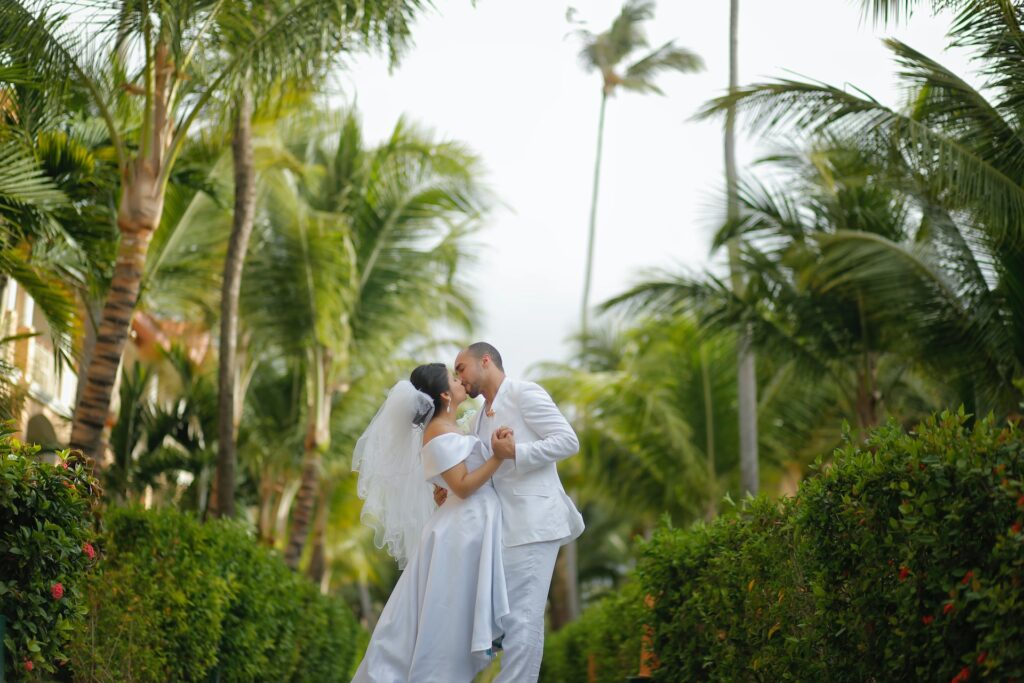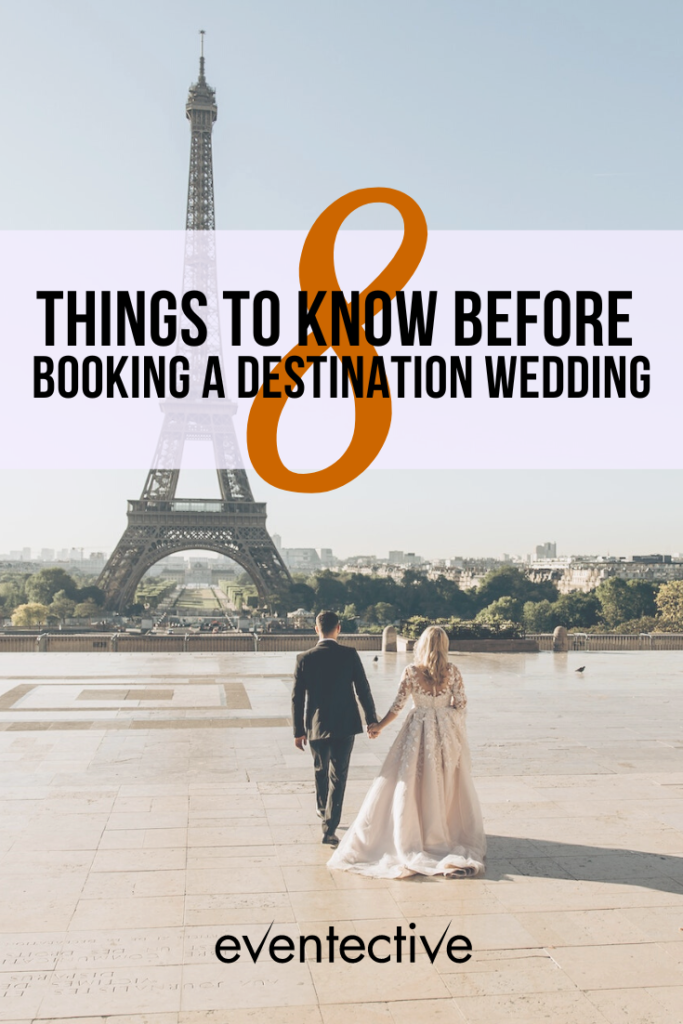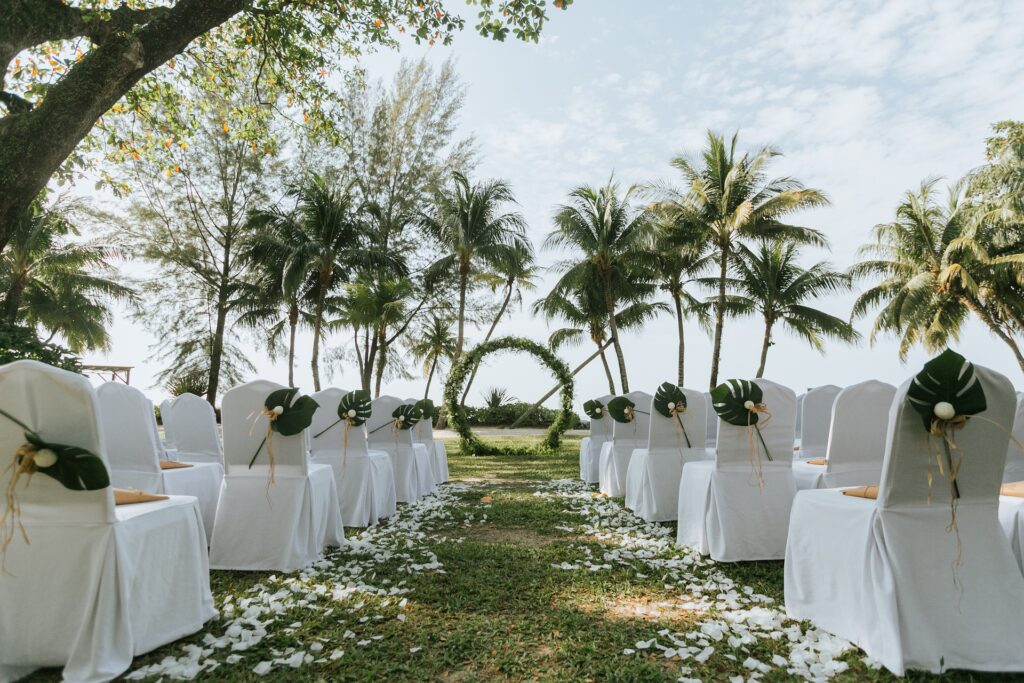
Booking a destination wedding is an exciting way to celebrate your nuptials. For starters, you can experience a climate or lifestyle that’s different from where you live. Maybe you live in a land-locked state, but you want to exchange vows on the waterfront. Or maybe the weather won’t be warm enough for the day of. Plus, destination weddings can easily transition into a honeymoon if you extend your stay.
But, as to be expected, a unique wedding location comes with unique planning experiences. Before you officially decide on booking a destination wedding, consider these eight ways that destination weddings are different. They might not deter you from booking your dream spot, but they will require extra time and money to make sure the day of goes smoothly.
1. Save the dates go out 8-12 months prior.

For a local wedding, save the dates typically go out 6-8 months in advance. That’s plenty of time for your guests to get a present, set up a babysitter, and book a flight. But if guests have to travel far—especially out of the country—they need more notice. With the extra time, they can make sure their travel documents are up to date, book accommodations and flights, and schedule house or pet sitters.
While this may seem like a long time, you’ll also be taking extra time to plan the wedding. So sending save the dates this far in advance will actually match your own wedding-planning timeline. Booking a destination wedding takes extra time all around!
2. Many guests may RSVP “no.”
For a local wedding, 20% to 30% of your guest list will RSVP “no.” But that might not be the case when you’re booking a destination wedding. Anywhere from 25% to 65% of your guest list will RSVP “no” to your destination wedding. We know—that’s a wide gap! There are so many factors that will affect your RSVPs, but it’s important to prepare for a lower attendance rate.
The cost of attending a destination wedding will deter some guests, as will the time required to travel. If you’re only inviting a small group of close friends and family, almost everyone may be able to come. But when you start inviting extended family and childhood friends, they might not be able to make it, even if they want to. That’s okay! Just be prepared for some inevitable no’s.
3. You might not visit the venue or taste the food ahead of time.

A destination wedding is simply a wedding that takes place outside of the city or state that the couple lives in. So your destination wedding could be just a few hours from your home. If that’s the case, you’ll be able to meet with vendors and visit venues ahead of time. But if you’re planning to exchange vows in a different country, you might not have that flexibility—or the finances!
Unless you frequent the location of your destination wedding, the further away you live, the harder it will be to visit. That’s why it’s helpful to hire a wedding planner who’s local to the destination. That way, they can walk you through the venue virtually and help you choose a local caterer and florist.
4. There will be extra costs that don’t exist for local nuptials.
Three common added expenses for destination weddings are wedding insurance, local taxes, and shipping a wedding dress. If you’re planning an out-of-country wedding, we recommend getting wedding insurance. Basic wedding insurance covers the cost of lost or damaged items, which is nice to have while traveling. It also covers injuries or accidents during the ceremony, which is nice to have in another country. And it will reimburse you in the event of a postponement or cancellation, which can happen if travel plans fall through.
On top of that, there will be the added cost of shipping a wedding dress. The seller may be able to coordinate the packaging and shipping, but you’ll still have to cover the costs. And you’ll have to figure out where to ship it, too. This certainly won’t cost as much as the dress, but it’s still an added expense to budget for—with local taxes and conversion rates factored in.
5. Laws and customs might be different in another country.

What documents do you need to get married out of state? What about out of the country? Every location will have their own protocols, but you’ll likely need to provide some form of official identification, including proof of residency. In addition, some places may require medical tests and affidavits confirming your marital status. The good news is that you shouldn’t have to register your marriage once you return home—but you should always double check your home state laws, too. For official details, visit the government websites for the United States and Canada.
6. Presents will come directly to you—before the wedding.
At a local wedding, guests bring the presents with them. But guests aren’t going to travel with a wrapped toaster oven. Instead, they will ship the presents to you ahead of the wedding day. The good news is that you won’t have to worry about lugging all your presents back home after your celebration! But is also means that you’ll need a spot for all your presents ahead of time, and someone to check your mail while you’re gone.
If you’re already living with your partner, this won’t be an issue—you can just have everything arrive at your home. But if you’re living separately or moving into a new place, coordinating your present arrival might be tricky. It might not be a deal breaker, but it’s still something to keep in mind when booking a destination wedding.
7. Finals payments can’t always be paid in cash.

Traditionally, final payments are made to the vendors on the day of your wedding. But not all vendors will accept that from out-of-country couples. Instead, they’ll prefer a bank transfer or another similar form of payment. And the vendors who do accept a final cash payment will expect payment in their currency. Once again, none of this is super tricky—you’ll just need to take a few extra steps to coordinate everything. (That’s why we recommend taking plenty of time to plan!)
8. You’ll probably plan events for the whole weekend, not just the wedding.
If friends and family are traveling out of state or country for your special day, they will probably extend their trip by a few days. And you probably won’t be staying for just the one day, either. So it’s common for couples to plan a weekend of activities with their guests to make the most of the trip. This could include a welcome dinner or day-after activities with everyone. It might even mean some sightseeing together. Whatever you plan will, of course, be optional. But it’s a great way to show your appreciation and spend time with your loved ones.
Conclusion
Booking a destination wedding is a lot of work—but it’s a lot of fun, too! You’re able to spend one of the best days in a beautiful spot with your friends and family. Of course, the challenge of planning an event out of state (or country!) has its own unique set of challenges and added costs to account for. So give yourself more time than you think you need before you get started.
Have you ever been to a destination wedding? Where would you plan your own destination wedding?

